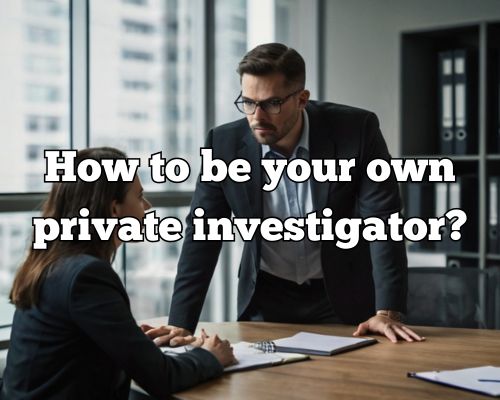Ever wondered if you have what it takes to be your own private investigator?
Being a private investigator like Ali Private Investigator Tampa, can be both thrilling and challenging. It combines skills in surveillance, research, and analysis.

To effectively conduct your own investigations, you need a blend of keen observation skills, a solid understanding of legal boundaries, and the ability to remain discreet and unbiased.
Embarking on this journey doesn’t require you to have a formal degree in criminal justice or law enforcement. However, relevant experience and training can significantly enhance your effectiveness.
Familiarize yourself with your local state licensing requirements to ensure you’re operating within the law. Many private investigators come from backgrounds in law enforcement or legal professions, adding a layer of professionalism and insight to their work.
Education and training play key roles. Even without formal education, training programs can equip you with necessary skills such as surveillance techniques, interviewing strategies, and evidence gathering.
Your ability to handle sensitive information and manage the emotional and mental challenges of investigative work will be crucial to your success.
Preparing for a Career as a Private Investigator
To embark on a career as a private investigator, you must meet specific educational and professional requirements, undergo necessary training, and adhere to state licensing regulations.
Educational Requirements
A high school diploma is the minimum requirement for becoming a private investigator (PI). Some employers prefer candidates with higher education, such as an associate or bachelor’s degree, especially in fields like criminal justice or law.
Specialized coursework can enhance your knowledge and make you more competitive in the job market. Relevant subjects include criminal law, ethics, and investigative techniques.
Degrees in criminal justice provide a strong foundation in the legal system, criminal behavior, and investigative methods. Formal education combined with practical experience can significantly improve job prospects and earning potential.
Professional Training and Skills Development
Training is crucial for becoming proficient as a private investigator. Many PIs start their careers with on-the-job training provided by their employers. This training often includes learning investigative procedures, surveillance techniques, and proper documentation methods.
Developing core skills such as critical thinking, communication skills, and problem-solving is vital.
Computer skills are equally important due to the increasing reliance on technology in investigations. Effective use of databases and online resources can be critical for conducting thorough investigations.
Aspiring PIs might also undertake training programs offered by professional organizations like the National Association of Legal Investigators or ASIS International.
These programs provide specialized training, networking opportunities, and resources critical for a successful career.
Obtaining Necessary Certification and Licensure
In most states, private investigators must obtain a license to practice. The specific licensing requirements vary by state but generally include passing a background check, completing a written exam, and meeting minimum age and education requirements.
Some states also require completion of relevant training courses or previous experience in a related field.
Certification from professional organizations, though not mandatory, can enhance your credentials. Certifications such as the Certified Legal Investigator (CLI) can demonstrate your commitment to the profession and increase your employment prospects.
Licensure ensures that PIs adhere to ethical standards and legal guidelines. Obtaining and maintaining licensure is crucial for practicing legally and successfully as a private investigator. Always refer to your state’s specific licensing board for detailed requirements and updates.
Building a Career in Private Investigation
Becoming a private investigator like Ali Private Investigator Tampa, requires acquiring practical experience, specializing in certain investigation services, and starting your own private investigation business.
Acquiring Practical Experience
Practical experience is essential for building a successful career as a private investigator. You can start by working in related fields such as law enforcement, military service, or with a private investigation firm.
Joining internships or apprenticeships with established private investigators can be beneficial. These experiences help you understand surveillance techniques, evidence collection, and conducting interviews.
Additionally, working for insurance companies, law firms, or paralegal offices can provide valuable insights into background checks and legal research.
Consider obtaining a degree or certification in criminal justice, which can enhance your credibility and knowledge of the legal parameters surrounding investigative work.
Specializing in Investigation Services
Specializing in specific types of investigation services can distinguish you in the field. Common specialties include background checks, fraud investigation, missing persons, accident scene reconstruction, and corporate investigations.
Specializing allows you to become proficient in niche areas, making you a valuable asset to clients seeking those specific services.
Training and courses focusing on your chosen specialty can further refine your skills.
Maintaining awareness of the latest tools and technologies in your specialization, such as advanced surveillance equipment or software for financial information analysis, keeps you competitive.
Specialization requires continuous learning and adapting to changes in laws and investigative techniques.
Starting a Private Investigation Business
Starting your own private investigation business can be a rewarding step in your career.
You’ll need to meet state licensure requirements. You might also need to obtain an Employer Identification Number (EIN) if hiring employees.
Create a solid business plan outlining your services, target market, financial projections, and marketing strategies.
Networking is crucial, so actively engage with local law firms, insurance companies, and corporations to build your client base.
Effective marketing, both online and offline, ensures you reach potential clients.
Joining professional associations for private investigators can provide ongoing education opportunities and industry connections.
Patience and resourcefulness are key as you navigate the challenges of building and maintaining your own private investigation firm.

